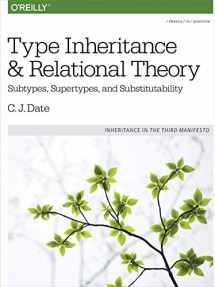
Type Inheritance and Relational Theory: Subtypes, Supertypes, and Substitutability
ISBN-13:
9781491959992
ISBN-10:
1491959991
Edition:
1
Author:
Chris Date
Publication date:
2016
Publisher:
O'Reilly Media
Format:
Paperback
569 pages
Category:
Information Theory
,
Computer Science
,
Data Warehousing
,
Databases & Big Data
,
SQL
,
Programming Languages
FREE US shipping
Book details
ISBN-13:
9781491959992
ISBN-10:
1491959991
Edition:
1
Author:
Chris Date
Publication date:
2016
Publisher:
O'Reilly Media
Format:
Paperback
569 pages
Category:
Information Theory
,
Computer Science
,
Data Warehousing
,
Databases & Big Data
,
SQL
,
Programming Languages
Summary
Type Inheritance and Relational Theory: Subtypes, Supertypes, and Substitutability (ISBN-13: 9781491959992 and ISBN-10: 1491959991), written by authors
Chris Date, was published by O'Reilly Media in 2016.
With an overall rating of 3.6 stars, it's a notable title among other
Information Theory
(Computer Science, Data Warehousing, Databases & Big Data, SQL, Programming Languages) books. You can easily purchase or rent Type Inheritance and Relational Theory: Subtypes, Supertypes, and Substitutability (Paperback) from BooksRun,
along with many other new and used
Information Theory
books
and textbooks.
And, if you're looking to sell your copy, our current buyback offer is $3.3.
Description
Type inheritance is that phenomenon according to which we can say, for example, that every square is also a rectangle, and so properties that apply to rectangles in general apply to squares in particular. In other words, squares are a subtype of rectangles, and rectangles are a supertype of squares. Recognizing and acting upon such subtype / supertype relationships provides numerous benefits: Certainly it can help in data modeling, and it can also provide for code reuse in applications. For these reasons, many languages, including the standard database language SQL, have long supported such relationships. However, there doesn’t seem to be any consensus in the community at large on a formal, rigorous, and abstract model of inheritance. This book proposes such a model, one that enjoys several advantages over other approaches, not the least of which it is that it’s fully compatible with the well known relational model of data.Topics the model covers include:Both single and multiple inheritanceScalar, tuple, and relation inheritanceType lattices and union and intersection typesPolymorphism and substitutabilityCompile time and run time bindingAll of these topics are described in detail in the book, with numerous illustrative examples, exercises, and answers. The book also discusses several alternative approaches. In particular, it includes a detailed discussion and analysis of inheritance as supported in the SQL standard.


We would LOVE it if you could help us and other readers by reviewing the book
Book review

Congratulations! We have received your book review.
{user}
{createdAt}
by {truncated_author}


